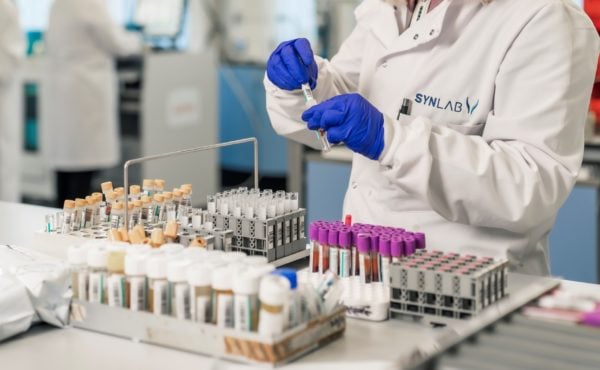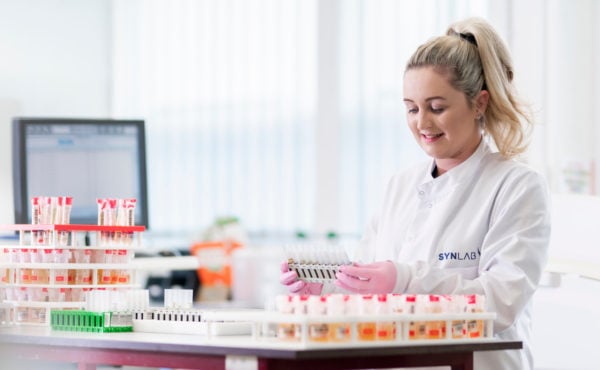Published: 24th December 2024 - All information correct at time of publication.

Passive exposure to cannabis and prescription cannabis
The law on cannabis
Cannabis is classified as a class B, schedule 2 drug in the UK, making it illegal to possess, give away or sell in the UK. However, as schedule 2 would suggest, this is with the exemption of those that are medically prescribed the drug (as defined in section 7 of the Misuse of Drugs Act 1971).
Cannabis is the most prevalent drug in the UK and has been for a long time (please see our recent blog on prevalence). Therefore, it is very likely that you have seen, or will see, a positive result sooner or later when conducting drug testing at work. This is especially true given the rise in active medical cannabis users; by the end of 2024 it is anticipated there will be approximately 340,000 users in the UK.
Reporting on a cannabis drug test
At SYNLAB Laboratory Services, a result is confirmed positive for Delta 9 THCC (the main metabolite of Cannabis) against a cut-off level of 15ng/ml. The cut-off level is defined by the European Workplace Drug Testing Society, and any results above 15ng/ml are reported as “positive” and any results below 15ng/ml are reported as “negative”. This cut off level is set to exclude passive exposure as an excuse for a cannabis positive result.
Drugs of abuse testing is a good way to provide a snapshot of the drug misuse of a donor; a positive cannabis result typically shows the consumption of cannabis in the previous two to five days prior to donating a urine sample. However, in cases where the donor is a regular user of cannabis, it has been shown to remain detectable in urine for up to 30 days from the last time cannabis was used. What urine drug testing cannot tell you is how much cannabis was used, when it was last used or exact frequency/ patterns of usage.

Reacting to common responses with science
“I visited someone who uses cannabis, I never smoked it…”
This can be a frequent response but is extremely unlikely to be true. Some studies have investigated whether passive cannabis exposure could cause a positive urine result, however, they have always focused on acute exposure.
Typically, these studies involve participants sitting for up to three hours in an enclosed space with cannabis smokers. For example, in a study six non-cannabis smoking volunteers sat in a small, enclosed room with six cannabis smokers. The smoke was so intense that eye protection was required. Not all the volunteers tested positive and those that did were only positive for four to 12 hours after exposure. When the experiment was repeated in a room with typical ventilation, none of the six volunteers tested positive, therefore, it is the opinion that passive exposure is only relevant in extreme situations. In most modern day situations, it would be very unlikely for anyone to be subject to such extreme scenarios.
“I am prescribed cannabis; this is why I am positive”
Prescription cannabis use does enter rather a grey area when it comes to drug testing. The first point to make is that during sample collection every donor is provided the opportunity to declare any current and recent medications they have used; it is very important to declare if they are prescribed cannabis at this point so this can be considered by the laboratory during testing. It is also vital to note at this stage that CBD/ hemp products are highly unlikely to cause a cannabis (THC) positive.
Secondly, prescribed cannabis enters the same metabolism pathway as cannabis purchased off the street; both entities break down to form Delta 9 THCC, which is the cannabis marker we test for. This makes it impossible to distinguish between the prescribed drug and the ‘street’ drug via urine drug testing. Therefore, we cannot determine if a donor is compliant with their prescription via urine drug testing as it is simply unable to tell when or how much of the drug was taken. Further to this, drug urine testing is unable to tell you if someone is supplementing their cannabis prescription with illicit cannabis.
The employer’s role in workplace drug testing

Prescription cannabis is known to exhibit similar psychoactive effects as street cannabis. When it comes to safety critical job roles, government advice is that the prescriber is responsible for telling the user the safety considerations for tasks such as driving – it is still illegal to drive whilst impaired under the Road Traffic Act 1988.
In the workplace, employers have a duty to comply with the Equality Act 2010 and make reasonable adjustments for employees with conditions treated by medical cannabis, including updating their drug and alcohol policy if necessary. At SYNLAB Laboratory Services, we generally would recommend prescription cannabis be given the same treatment as employees using other prescription only medications, in line with company policy. Further guidance on prescription cannabis use in the workplace should be sought from occupational health providers.
If you’d like more information on our drug and alcohol testing services, or to book a collection, please get in touch here.
Published 24/12/24. All information correct at time of publication.
Written by Fern Read – Junior Reporting Scientist
Fern Read | Junior Reporting Scientist
Fern has an integrated master’s in forensic science from the University of the West of England, awarded June 2021, she is also a member of LTG, CSFS, SoHT and EWDTS.
Fern joined SYNLAB Laboratory Services in 2024 as part of the toxicology reporting team where she is involved in processing, reviewing, and authorising toxicology results.
Fern is also involved in the routine running and troubleshooting of the analysers, including sample reception and confirmation testing and has undertaken projects within the business ranging from research and development and undertaking internal audits. Prior to joining SYNLAB Laboratory Services, Fern gained experience in drug and alcohol testing reporting for family law. It was during this time period she was awarded the Bond Solon Expert Witness Certificate for Family Law Practices and attended court as an expert witness where required.





